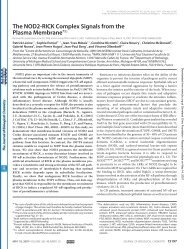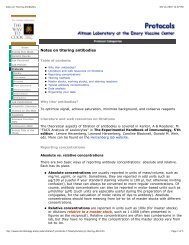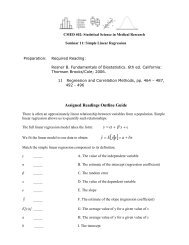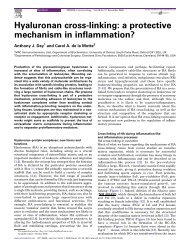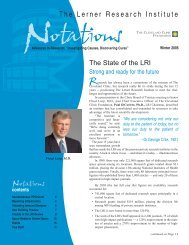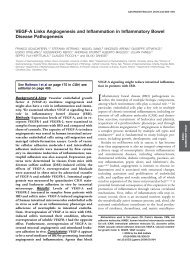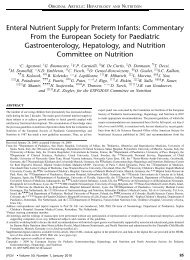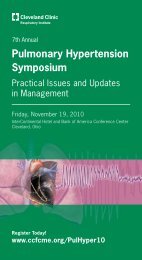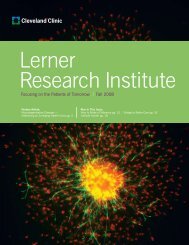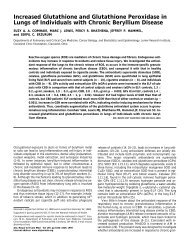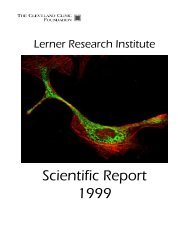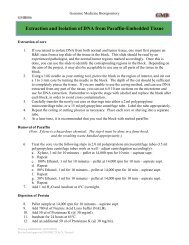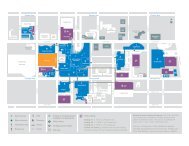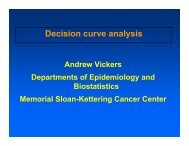Scientific Report 2003-2004 - Cleveland Clinic Lerner Research ...
Scientific Report 2003-2004 - Cleveland Clinic Lerner Research ...
Scientific Report 2003-2004 - Cleveland Clinic Lerner Research ...
- No tags were found...
Create successful ePaper yourself
Turn your PDF publications into a flip-book with our unique Google optimized e-Paper software.
DEPARTMENTOF IMMUNOLOGYCHAIRMANThomas A. Hamilton, Ph.D.STAFFRobert L. Fairchild, Ph.D.James H. Finke, Ph.D.Andrew Larner, M.D., Ph.D.Dennis J. Stuehr, Ph.D.Vincent Tuohy, Ph.D.ASSOCIATE STAFFCharles L. Bevins, M.D., Ph.D.Peter Heeger, M.D.ASSISTANT STAFFMark Aronica, M.D.Xiaoxia Li, Ph.D.PROJECT SCIENTISTSKulwant Aulak, Ph.D.Sudip Bandyopadhyay, Ph.D.Roopa Biswas, Ph.D.Alana Majors, Ph.D.Charles S. Tannenbaum, Ph.D.Julie M. Tebo, Ph.D.Anna Valujskikh, Ph.D.Chin-Chuan Wei, Ph.D.RESEARCH ASSOCIATESAnton Gorbachev, Ph.D.Zhengfan Jiang, Ph.DZhigiang Wang, Ph.D.Koustubh Panda, Ph.D.Continued on Page 87The Department of Immunology has six fullStaff members (Drs. Thomas Hamilton, JamesFinke, Robert Fairchild, Andrew Larner,Dennis Stuehr, and Vincent Tuohy), two AssociateStaff (Drs. Charles Bevins and Peter Heeger) and twoAssistant Staff (Drs. Xiaoxia Li and MayumiNaramura). In addition, eight investigators holdprimary departmental appointments in clinicaldivisions. Of these, three (Mark Aronica [Pulmonaryand Critical Care Medicine], Scott Strong [ColorectalSurgery] and Anthony Stallion [Pediatric Surgery])have active laboratory research programs housed inthe Department of Immunology. The remaining five(Drs. Ashok Agarwal [Urological Institute], RonaldBukowski [Taussig Cancer Center, Hematology-Oncology], Peter Cohen [Center for Surgery<strong>Research</strong>], Victor Perez [Cole Eye Institute] andRaymond Tubbs and Belinda Yen-Lieberman [bothof <strong>Clinic</strong>al Pathology]) participate in substantialThe Department of ImmunologyInteractive Programs Aim to DefineInteractions Between Adaptive andInnate Immune Systemscollaborative interactions with colleagues holdingprimary appointments in Immunology and therebyserve as important liaisons between the laboratorybench and the clinical setting.<strong>Research</strong> programs within the department arepursued within two broad themes. The first includesstudies of T-cell development and function at thecellular and molecular levels, using a variety ofdisease models. Areas of focus include the recruitmentand function of specific T cells at sites of organtransplantation, the development and evolution ofspecific T-cell populations in autoimmune disease,and the suppression of T-cell responses in cancerpatients.The second theme centers on the regulationand function of the innate immune system. Specificprograms include the regulation of cytokine signalingand gene expression, the control of inflammatoryresponses in a range of disease models, the biochemistryand enzymology of nitric oxidesynthases, and the identification andcharacterization of mammalian antimicrobialpeptide genes.These broad themes provideremarkable opportunities forinteraction among the individuallaboratories and together represent aconcept that integrates the departmentas a whole: the interface betweeninnate and acquired immunity and theresulting complexity of immunemediatedinflammation. This conceptappears to be highly relevant in aspectrum of clinically importantentities that have either acute orchronic inflammation as a keycausative or symptomatic feature ofpathogenesis.Continued on Page 87Thomas A. Hamilton, Ph.D.86



